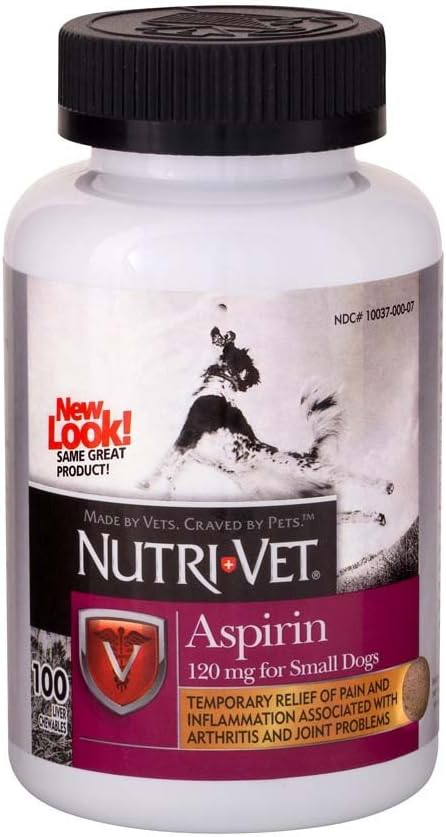It’s honestly heartbreaking to see Jeff suffer when he’s in pain. As responsible dog owners, we must ensure their well-being and provide the necessary care, including effective pain relief.
However, choosing the right painkiller for your dog can be daunting. And yes, I’m only talking about over-the-counter meds today. With a wide range of options available in the UK market, you must understand the variables to make informed decisions.
First, let’s get the most common question answered: can you give human meds to your dog?
Generally, it’s not recommended to give human painkillers to dogs without the guidance and approval of a veterinarian. While some human painkillers may be safe for dogs in specific circumstances, many medications can be harmful or toxic since their metabolism differs from ours.
Human painkillers like nonsteroidal anti-inflammatory drugs (NSAIDs) like ibuprofen, aspirin, or acetaminophen (paracetamol) can be particularly dangerous for dogs. When given to our furry friends, these medications can cause gastrointestinal issues, liver damage, kidney failure, or other serious complications.
So, what can you give to your doggo? Let’s find out.
Top 5 Over-the-Counter Painkillers in the UK
Proper pain management is crucial in enhancing your dog’s quality of life and promoting their overall well-being.
I know I’ve only been saying NO so far, but there are painkillers geared towards dogs. These medications have been approved for use in dogs and are readily available with a prescription from a veterinarian.
1. Nutri-Vet K-9 Aspirin

Nutri-Vet K-9 Aspirin Chewable Tablets are designed to provide temporary pain relief for dogs, particularly those suffering from hip and joint problems.
These chewable tablets contain aspirin (acetylsalicylic acid), which effectively alleviates minor aches and pains caused by chronic arthritis and hip dysplasia. Moerover, the aspirin helps to reduce fever and moderate inflammation, promoting greater comfort for your furry friend.
It’s important to consult your veterinarian before using Nutri-Vet K-9 Aspirin, especially if your dog has any pre-existing medical conditions or is taking other medications.
Recommended Dosage: The recommended dosage is 5 mg per 1 lb of body weight every 12 hours, with a maximum usage of 3 consecutive days. However, it shouldn’t be given to puppies under six months old, dogs weighing less than 6 lbs, or cats. Administration of this product should be done within 30 minutes after your dog has ingested at least 1/3 of its normal daily food intake.
As with any medication, it is crucial to follow the provided instructions and warnings. If any adverse reactions such as vomiting, diarrhea, depression, or loss of appetite occur, discontinue use and consult your veterinarian immediately.
Buy Nutri-Vet K-9 Aspirin for Small Dogs on Amazon
Buy Nutri-Vet K-9 Aspirin for Medium to Large Dogs on Amazon
2. Rimadyl (Carprofen)
Carprofen is a popular NSAID in the UK that’s commonly prescribed for dogs associated with conditions such as osteoarthritis or postoperative discomfort.
Rimadyl, the brand used for carprofen, is specifically formulated for canine use and is considered safer than human NSAIDs such as ibuprofen, naproxen, or aspirin.
It generally comes in three forms: caplets, chewable tablets, and injections. Your veterinarian will determine the most suitable form for your dog based on their specific needs and condition.
Warning: While Rimadyl is generally well-tolerated by dogs, it is important to be aware of potential side effects, especially with long-term use. The most common side effects are related to the gastrointestinal (GI) tract and may include vomiting, diarrhea, and ulcers.
For more info, check akc.org – Rimadyl.
3. Metacam (Meloxicam)
Meloxicam is another commonly used NSAID in the UK for pain relief in dogs. It’s sold under different brand names such as Metacam® Loxicom®, OroCAM®, Rheumocam – with Metacam being the most commonly available.
It works by blocking COX (cyclooxygenase) enzymes, which play a crucial role in the body’s inflammatory response. By reducing inflammation, meloxicam provides relief from pain and stiffness associated with arthritis.
It’s available in different forms, including oral suspension (liquid) and human tablets that can be prescribed for dogs. Your veterinarian will determine the most suitable form and dosage based on your dog’s condition, age, and weight.
Warning: Common side effects may include nausea, vomiting, diarrhea, low appetite, lethargy, and itching. In rare cases, meloxicam can lead to more serious complications such as ulcers, kidney failure, and gastrointestinal bleeding.
Read More: 5 Homemade Recipes to Help Fix Your Doggo’s Diarrhoea / Loose Stool
4. Buprenorphine
Buprenorphine is an opioid medication for dogs’ moderate to severe pain management.
It can be administered orally or through injection, providing effective relief for dogs undergoing surgical procedures or experiencing acute pain. Buprenorphine binds to opioid receptors in the brain and spinal cord, reducing pain sensation.
5. Gabapentin
Gabapentin is a medication commonly used as an adjunctive therapy for pain management in dogs. It is particularly useful for neuropathic pain or chronic conditions such as degenerative disc disease. Gabapentin works by modulating nerve activity and can help alleviate pain in dogs.
It’s important to note that pain-relief medications should be selected in consultation with a veterinarian for the sake of your doggo’s safety.
Types of Pain-Relief Medication Available for Dogs

Specific medications for pain relief in dogs are designed and approved for veterinary use. These medications can help manage pain effectively and safely, provided they’re prescribed by a veterinarian.
1. Non-Steroidal Anti-Inflammatory Drugs (NSAIDs)
NSAIDs are commonly used to alleviate pain and reduce inflammation. They work by blocking enzymes that cause these two symptoms. These medications require a prescription from a veterinarian and should be used with caution and under professional guidance.
If you’re interested in a deep dive into the use of NSAIDs for pain relief in dogs, here’s a great article by FDA.
2. Opioids
Opioids are powerful pain-relief medications commonly used in moderate to severe pain cases. These meds bind to specific brain and spinal cord receptors to block pain signals.
In the UK, some commonly used opioids for dogs include tramadol, buprenorphine, and morphine. These medications are generally administered in controlled doses and may require close monitoring for adverse effects.
3. Other Pain-Relief Medications
In addition to NSAIDs and opioids, other pain-relief medications may be used in specific situations or as adjunctive therapies.
One such medication is gabapentin, an anticonvulsant that can also help manage certain types of chronic pain in dogs. Tramadol is an opioid-like medication that’s sometimes used as an adjunctive pain-relief option.
Read More: How to naturally treat constipation in dogs?
How to choose the best painkiller for your dog?
Generally, there are two steps to choosing the ideal painkiller for your dog – consult a vet to understand the situation. And then, choose a painkiller for your dog based on age, breed, weight and overall health.
1. Consultation with a Veterinarian
The expertise of a veterinarian is invaluable when it comes to managing your dog’s pain.
A veterinarian will thoroughly examine the dog’s overall health, consider any underlying conditions or medications, and recommend the most appropriate pain-relief options. They’ll also guide you on dosage, administration, and potential side effects.
Diagnosing and treating a dog’s pain without professional guidance can be risky and lead to improper medication use or ineffective pain management.
2. Individual Dog Factors
As I said earlier, age, breed, weight, and overall health should all be considered when choosing your dog’s best painkiller.
Certain medications may be more suitable for certain breeds or health conditions, while others may carry higher risks in particular age groups.
Additionally, it is important to consider any pre-existing health conditions the dog may have, such as liver or kidney disease, as these can impact the choice of pain-relief medication.
Dogs with known sensitivities or allergies to specific medications should also be carefully managed to avoid adverse reactions.

How to know if your dog is in pain?
Pain is a common and distressing experience for dogs, just like humans.
It can be caused by injury, surgery, arthritis, dental issues, or underlying health conditions. Dogs may display subtle signs of pain, such as decreased appetite, lethargy, restlessness, or changes in behaviour.
Being observant and attentive to these signs is essential, as early recognition and management of pain can greatly improve a dog’s quality of life.
Here are some of the symptoms to help you recognise:
1. Changes in Appetite: A noticeable decrease in appetite or reluctance to eat may indicate that your dog is experiencing pain.
2. Lethargy and Reduced Activity: If your dog is unusually inactive, lacks energy, or avoids engaging in their usual activities, it could be a sign of pain.
3. Altered Sleeping Patterns: Dogs in pain may have difficulty finding a comfortable resting position and may have disrupted sleep patterns.
4. Changes in Social Behavior: They may become withdrawn, avoid interactions with family members or other pets, or show aggression or irritability when touching or approaching.
5. Vocalisations and Excessive Panting: Whimpering, yelping, groaning, or excessive panting can indicate pain in dogs.
6. Licking or Chewing a Specific Area: If your dog excessively licks or chews a specific area of their body, it may be a sign of localised pain, such as from an injury, wound, or inflammation.
7. Changes in Posture and Mobility: They may have a hunched or tense body posture, favour certain limbs, are limp, or have difficulty climbing stairs or jumping onto furniture.
It’s important to note that these symptoms can vary depending on the individual dog and the underlying cause of the pain. If you suspect your dog is in pain, it is best to consult with a veterinarian for a thorough examination and appropriate treatment.
Frequently Asked Questions
1. Can I give over-the-counter pain medication to my dog?
Giving over-the-counter pain medication to your dog without veterinary guidance is not recommended. Human pain medications can be toxic to dogs and may cause serious harm. Always consult your veterinarian for proper pain-relief medication options.
2. Are all pain-relief medications suitable for all dogs?
Not all pain-relief medications are suitable for every dog. The dog’s age, breed, size, overall health, and specific medical conditions should be considered. Consulting with a veterinarian is crucial to determine the most appropriate pain-relief medication for your dog.
3. Are there any natural alternatives to pain-relief medication for dogs?
Generally speaking, some natural alternatives, such as supplements like glucosamine and chondroitin, may provide pain relief for dogs. However, it’s important to note that the effectiveness of these alternatives may vary, and it’s best to consult with a veterinarian.
4. What should I do if my dog shows signs of pain?
If you suspect that your dog is in pain, it’s important to consult with a veterinarian as soon as possible. They can properly assess your dog’s condition, determine the underlying cause of the pain, and recommend appropriate pain-relief medication or treatment options.
5. Can you give Ibuprofen or Aspirin to dogs?
Giving Ibuprofen or Aspirin to dogs without proper veterinary guidance is not recommended. Both of these meds belong to a class of medications called non-steroidal anti-inflammatory drugs (NSAIDs), commonly used for pain relief in humans and can be toxic to dogs.




